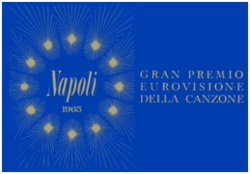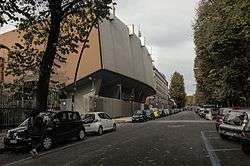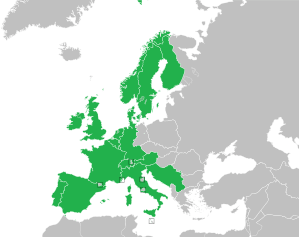Eurovision Song Contest 1965
The Eurovision Song Contest 1965 was the 10th edition of the annual Eurovision Song Contest. It took place in Naples, Italy, following Gigliola Cinquetti's win at the 1964 contest in Copenhagen, Denmark with the song "Non ho l'età". It was the first time the contest took place in Italy, also marking the first time the Italian Peninsula and Southern European country hosted the event. The contest was held at Sala di Concerto della RAI on Saturday 20 March 1965, and was hosted by Renata Mauro.
| Eurovision Song Contest 1965 | |
|---|---|
 | |
| Dates | |
| Final | 20 March 1965 |
| Host | |
| Venue | Sala di Concerto della RAI Naples, Italy |
| Presenter(s) | Renata Mauro |
| Conductor | Gianni Ferrio |
| Directed by | Romolo Siena |
| Executive supervisor | Miroslav Vilček |
| Host broadcaster | Radiotelevisione Italiana (RAI) |
| Interval act | Mario Del Monaco |
| Website | eurovision |
| Participants | |
| Number of entries | 18 |
| Debuting countries | |
| Returning countries | |
| Non-returning countries | None |
Participation map
| |
| Vote | |
| Voting system | Ten-member juries awarded points (5, 3 and 1, or combinations thereof) to their three favourite songs. |
| Nul points | |
| Winning song | "Poupée de cire, poupée de son" |
Eighteen countries participated in the contest - setting a new record for the highest number of entrants. Sweden returned after their absence from the previous edition, while Ireland made their debut.
The winner was Luxembourg with the song "Poupée de cire, poupée de son", performed by France Gall, and written/composed by Serge Gainsbourg. This was Luxembourg's second victory in the contest, following their win in 1961. It was also the first winning song since the Netherlands' "Een beetje" in 1959 to not be a ballad.
For the fourth consecutive year, four countries all scored nul points; Belgium, Finland, Germany, and Spain - all of which finished with no points for the second time in the contest's history.[1]
Location

The contest took place in Naples, the capital of region Campania in southern Italy and the third-largest city in Italy, after Rome and Milan. This is Italy's first hosting of the Eurovision Song Contest. The host venue was the then new Sala di Concerto della RAI (RAI Production Centre of Naples), founded few years prior to the contest, in the late fifties and early sixties. It is located in Viale Marconi in the district of Fuorigrotta. The structure has three TV studios for a total of 1227 m² and capacity of 370 persons, used for the filming of programs and fiction and an auditorium. The Neapolitan song archives are also housed in it.[1][2]
Format
Each country had 10 jury members who distributed three points among their one, two, or three favourite songs. The points were totalled and the first, second, and third placed songs were awarded 5, 3, and 1 votes in order. If only one song got every point within the jury it would get all 9 points. If only two songs were chosen, the songs would get 6 and 3 points in order.
Participating countries
18 countries took part, with the Eurovision Song Contest reaching its highest ever number. Sweden returned after a one-year absence, and Ireland debuted in the competition. Luxembourg won for the second time with the highly controversial Poupée De Cire, Poupée De Son sung by teenager France Gall which later went on to be a massive hit in almost all European countries.[1] Belgium, Finland, Germany, and Spain all scored null points for the second time. The competition was also broadcast via the Intervision network, to the Eastern European nations for the very first time.[1]
Ingvar Wixell, the Swedish participant performed his song in English instead of the original Swedish title "Annorstädes vals". The native languages were used for all of the other participants. This led to a rule being introduced for the next 1966 edition, that meant all participants had to perform their songs using one of their national languages.[1]
Returning artists
Three artists returned for a second time in this year's contest: Udo Jürgens from Austria, whose previous participation was in 1964; Conchita Bautista from Spain, whose previous participation was in 1961; and Vice Vukov from Yugoslavia, who last participated in 1963.
Conductors
Each performance had a conductor who led the orchestra.[3][4]


.svg.png)




.svg.png)








.svg.png)

Results
Scoreboard
Each country had 10 jury members who distributed three points among their one, two, or three favourite songs. The points were totalled and the first, second, and third placed songs were awarded 5, 3, and 1 votes in order. If only one song got every point within the jury it would get all 9 points. If only two songs were chosen, the songs would get 6 and 3 points in order.
| Voting results | ||||||||||||||||||||
|---|---|---|---|---|---|---|---|---|---|---|---|---|---|---|---|---|---|---|---|---|
| Netherlands | 5 | 5 | ||||||||||||||||||
| United Kingdom | 26 | 5 | 1 | 6 | 3 | 1 | 5 | 5 | ||||||||||||
| Spain | 0 | |||||||||||||||||||
| Ireland | 11 | 3 | 5 | 3 | ||||||||||||||||
| Germany | 0 | |||||||||||||||||||
| Austria | 16 | 3 | 5 | 5 | 3 | |||||||||||||||
| Norway | 1 | 1 | ||||||||||||||||||
| Belgium | 0 | |||||||||||||||||||
| Monaco | 7 | 5 | 1 | 1 | ||||||||||||||||
| Sweden | 6 | 3 | 3 | |||||||||||||||||
| France | 22 | 1 | 3 | 1 | 3 | 5 | 3 | 1 | 5 | |||||||||||
| Portugal | 1 | 1 | ||||||||||||||||||
| Italy | 15 | 3 | 1 | 1 | 3 | 3 | 3 | 1 | ||||||||||||
| Denmark | 10 | 5 | 5 | |||||||||||||||||
| Luxembourg | 32 | 5 | 1 | 3 | 5 | 5 | 3 | 1 | 1 | 5 | 3 | |||||||||
| Finland | 0 | |||||||||||||||||||
| Yugoslavia | 2 | 1 | 1 | |||||||||||||||||
| Switzerland | 8 | 3 | 5 | |||||||||||||||||
5 points
Below is a summary of all 5 points in the final:
| N. | Contestant | Voting nation |
|---|---|---|
| 4 | Luxembourg | Austria, Finland, Germany, Netherlands |
| United Kingdom | Belgium1, Denmark, Spain, Switzerland | |
| 2 | Austria | Ireland, Portugal |
| France | Monaco, Yugoslavia | |
| Denmark | Luxembourg, Sweden | |
| 1 | Ireland | Italy |
| Monaco | United Kingdom | |
| Netherlands | Norway | |
| Switzerland | France |
- 1.^ Belgium gave the United Kingdom 6 points.
Broadcasters, commentators and spokespersons
Spokespersons
Listed below is the order in which votes were cast during the 1964 contest along with the spokesperson who was responsible for announcing the votes for their respective country.[6]


.svg.png)




.svg.png)








.svg.png)

Broadcasters and commentators
Each national broadcaster also sent a commentator to the contest, in order to provide coverage of the contest in their own native language.
| Country | Broadcaster(s) | Commentator(s) | Ref(s) | |
|---|---|---|---|---|
| Participating countries | ||||
| ORF | Willy Kralik | |||
| RTB | French: Paule Herreman | [6] | ||
| BRT | Dutch: Herman Verelst | [6] | ||
| DR TV | Eric Danielsen | [6] | ||
| Suomen Televisio | Aarno Walli | [6] | ||
| Yleisohjelma | Erkki Melakoski | [10] | ||
| Première Chaîne ORTF | Pierre Tchernia | [11][12] | ||
| Deutsches Fernsehen | Hermann Rockmann | [6][13] | ||
| Telefís Éireann | Bunny Carr | [6] | ||
| Radió Éireann | Kevin Roche | |||
| Programma Nazionale | Piero Angela | [6] | ||
| Télé-Luxembourg | Pierre Tchernia | [12] | ||
| Télé Monte Carlo | ||||
| Nederland 1 | Teddy Scholten | [6][14] | ||
| NRK and NRK P1 | Erik Diesen | [6] | ||
| RTP | Henrique Mendes | [6] | ||
| TVE | Federico Gallo | [6] | ||
| Sveriges TV and SR P1 | Berndt Friberg | [6][15] | ||
| TV DRS | German: Theodor Haller | |||
| TSR | French: Jean Charles | [11] | ||
| TSI | Italian: Carlo Bonomi | [6] | ||
| BBC1 | David Jacobs | [6][4] | ||
| BBC Light Programme | David Gell | |||
| Televizija Beograd | Serbo-Croatian: Miloje Orlović | |||
| Televizija Zagreb | Serbo-Croatian: Mladen Delić | |||
| Televizija Ljubljana | Slovene: Tomaž Terček | |||
| Non-participating countries | ||||
| ČST | Unknown | [4] | ||
| Deutscher Fernsehfunk | Unknown | [4] | ||
| RTV | Unknown | [4] | ||
| TVP | Unknown | [4] | ||
| TVR | Unknown | [4] | ||
| CT USSR | Unknown | [4] | ||
References
- "Eurovision Song Contest 1965". EBU. Retrieved 14 June 2012.
- "Sala di Concerto della RAI". Radio.Rai. Retrieved 14 June 2012.
- "andtheconductoris.eu". andtheconductoris.eu. Retrieved 29 February 2016.
- Roxburgh, Gordon (2012). Songs for Europe: The United Kingdom at the Eurovision Song Contest. Volume One: The 1950s and 1960s. Prestatyn: Telos Publishing. pp. 369–381. ISBN 978-1-84583-065-6.
- "Eurovision Song Contest 1965". The Diggiloo Thursh. Retrieved 4 March 2012.
- "Eurovision 1965 - Cast and Crew". IMDb. Retrieved 18 July 2020.
- "18 landen azen op het Eurovisie-goud", Limburgsch Dagblad, 20 March 1965
- "Infosajten.com". Infosajten.com. Archived from the original on 18 July 2012. Retrieved 10 August 2012.
- Tchernia, Pierre et al. (20 March 1965). 14ème Concours Eurovision de la Chanson 1965 [10th Eurovision Song Contest 1965] (Television production). Italy: RAI, ORTF (commentary).
- "18 iskelmää osallistuu tänään Eurovisiokilpailuun Napolissa", Helsingin Sanomat, 20 March 1965
- "Programme TV du 19 au 20 mars". Radio TV - Je vois tout. Lausanne, Switzerland: Le Radio SA. 11 March 1965.
- Christian Masson. "1965 – Naples". Songcontest.free.fr. Retrieved 10 August 2012.
- "Tag – TV-Programme". www.tvprogramme.net. Archived from the original on 22 November 2005.
- "Nederlandse televisiecommentatoren bij het Eurovisie Songfestival". Eurovision Artists (in Dutch).
- Thorsson, Leif (2006). Melodifestivalen genom tiderna ["Melodifestivalen through time"]. Stockholm: Premium Publishing AB. p. 54. ISBN 91-89136-29-2.
External links
| Wikimedia Commons has media related to Eurovision Song Contest 1965. |

